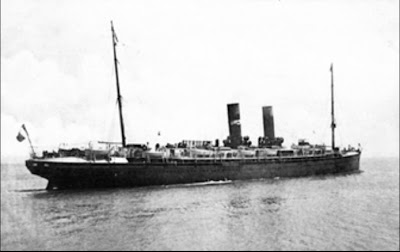This was the ship that Elias, my great grandfather came over on. He arrived at Ellis Island, alone, age 18...with 15$ in his pocket and a ticket onward to New York City. The ships manifest listed him as a farmer, dark skin, brown hair, 4'-8" tall. In line before him were the Yacoub family...US Citizens returning from Beirut to St. Charles, LA...presumably with more family. I like to think Elias confided in them on his trip over.
His journey wasn't as simple as one would think. He took a boat first from Beirut (Beyrouth) that would have most likely gone first to Alexandria, Egypt, then Italy and then to Marseille, France. From there, they departed from the boat and got on a train, crossing the country to a port and their final boat for America. for Elias this was the La Gascogne at Le Havre, France. This is all a guess. But according to a researcher that I just heard speak, the train ride would save the passengers actually three days of travel, and a significant amount of money.
The researcher is Raff Ellis, the author of "Kisses from a Distance." He spoke at AUB this week with the topic "The Lebanese Emigration - 1881-1914". Nearly every detailed matched my family stories.
So, who were the people leaving Lebanon at this time? Mostly Christians in fact. The Lebanese spread out all over the world, but mostly Christians headed to the US. The most common of them the Maronites (typically farmers and laborers) and the Orthodox (mostly traders and merchants)...Elias was a shoe man...and I was
always told we were Greek Orthodox, which translated into "Catholic" in Mid-Missouri.
Why did they leave? Ellis gave three factors that prompted the mass exodus. Elias left in 1907, during a time of peace. In fact the period of 1864-1914 is called the "long peace" and contrary to what we assumed, it was this peace that caused them to leave and not war. Due to no war, a large population increase created cramped quarters for most Lebanese. Food was also limited. According to Ellis, the demand for silk was so great that the majority of farmers were growing Mulberry for the silkworms, greatly reducing the amount of food crops being grown. And lastly, the lack of arable land, especially in the mountains, where Elias was from, contributed to the urges to leave. An urban myth was the departure due to religious persecution from the Ottomans. From this guys discussion, this isn't true.
And how did they leave? I am not sure exactly what prompted Elias towards the end of this "long peace" to "finally" get up and go...but if it has anything to do with our family traits, we are the type to wait and see what ever one else is doing and if it looks okay...we jump on board. Ellis told examples of steamship agents that would pass through villages encouraging people to buy a ticket on their boat (to seek their fortunes), other options existed such as local "Simsars" or money lenders and land holders, and others were prompted simply by money from family that had already left. Again, I am not sure what prompted Elias...I was always told it was due to war?
Once Elias arrived at Ellis Island, there would have been a translator present at the point of entry. His name would have actually been entered BEFORE he got into Ellis Island, as the ships manifest from France (or Beirut?) would have been handed right over to the US officials. He gave the name Elias Ghosn, but later would change it to Elias Thomas. His father's name was Ghosen (or Ghosn) Thomas. It was common for the sons to take on their fathers name. In fact, upon MY arrival here in Beirut, they tried listing my name as James James Thomas. The forms I was filling out asked for my full name and my fathers name. They would place my fathers name as my middle name. So I don't know who to look for in the village...a Thomas or a Ghosn?
And the search continues...




WOW ... So interesting ... I can't wait for the mystery to unfold ... SO GREAT!
ReplyDeleteReally 4 feet 8 inches? nuts!
ReplyDeleteVery cool story!
yeah, i am not sure if this is really correct...but my grandfather isn't that all?
ReplyDelete